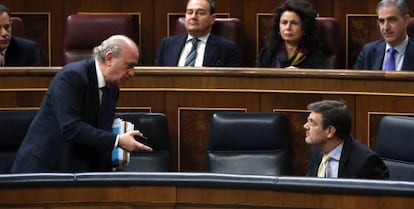PP to introduce life sentences despite opposition rejection
Ruling party to push through penal reform bringing in life terms reviewable after 25 years

Despite objections from opposition lawmakers, ruling Popular Party (PP) deputies were expected late Wednesday to pass the government’s changes to the penal code which, among other things, will introduce life prison sentences for dangerous offenders with the possibility for review.
The bill is expected to go to the Senate before being sent back to Congress for final approval by summer, according to PP officials, who hold the majority in both chambers. Judges could start handing down life terms as early as next year.
Maximum prison terms in Spain are currently set at 40 years without review for the most dangerous crimes. Under the new law, review of life sentences can take place after an inmate serves between 25 and 35 years of their term and depending on the crime.
The PP has rejected notions that the move is a government response to a rash of hideous crimes
This is the first time that a single party has passed such a far-reaching reform without support from any opposition groups.
“This is strange,” said Emilio Olabarría, a member of the Basque Nationalist Party (PNV).
“It doesn’t matter to them that none of us or any of the experts have rejected this?” asked Rosa Díez, spokeswoman for the Union, Progress and Democracy party (UPyD).
The controversial changes were drafted by former Justice Minister Alberto Ruiz-Gallardón in 2012 and were part of the PP’s election platform. At the time, Ruiz-Gallardón rejected notions that the move was the government's response to a rash of vicious crimes, including the 2009 Marta del Castillo murder case, and the 2011 murders of siblings José and Ruth Bretón Ortiz by their father José Bretón Gómez, who is now serving a 40-year sentence.
“This reform is unnecessary,” said Julio Villarrubia, a Socialist in Congress. “It is a step back in our system of rights and liberties and is based on punitive populism.”
In 2010, all political groups, with the exception of the PP, approved modifications to the penal code, which included a 40-year maximum sentence without the possibility of review. The PP, which was in opposition at the time, declined to vote in favor because the reform rejected life sentences, Villarrubia recalled.
Incoming Attorney General Consuelo Madrigal, who was nominated by the PP, recently testified before Congress that Spain’s penal code was among the most severe in Europe.
Another revision that has also been rejected by opposition groups is the curtailing of a list of offenses considered crimes under the penal code. These offenses will now be reclassified as misdemeanors or punishable by administrative sanctions under the Citizen Safety Law.
The PP and the Socialists did agree to remove sections of the code dealing with terrorism so that both parties can draft a joint anti-terror law. Earlier this month, the two major political forces decided to revamp terrorism legislation in response to the recent attacks in Paris.
Tu suscripción se está usando en otro dispositivo
¿Quieres añadir otro usuario a tu suscripción?
Si continúas leyendo en este dispositivo, no se podrá leer en el otro.
FlechaTu suscripción se está usando en otro dispositivo y solo puedes acceder a EL PAÍS desde un dispositivo a la vez.
Si quieres compartir tu cuenta, cambia tu suscripción a la modalidad Premium, así podrás añadir otro usuario. Cada uno accederá con su propia cuenta de email, lo que os permitirá personalizar vuestra experiencia en EL PAÍS.
En el caso de no saber quién está usando tu cuenta, te recomendamos cambiar tu contraseña aquí.
Si decides continuar compartiendo tu cuenta, este mensaje se mostrará en tu dispositivo y en el de la otra persona que está usando tu cuenta de forma indefinida, afectando a tu experiencia de lectura. Puedes consultar aquí los términos y condiciones de la suscripción digital.








































